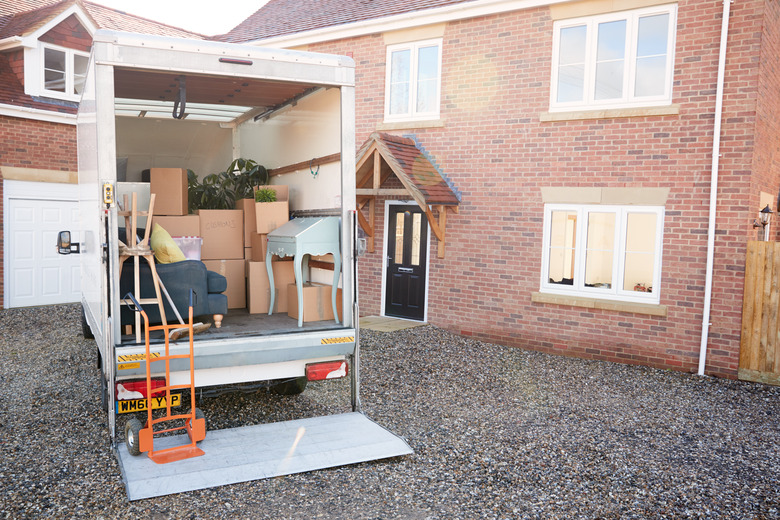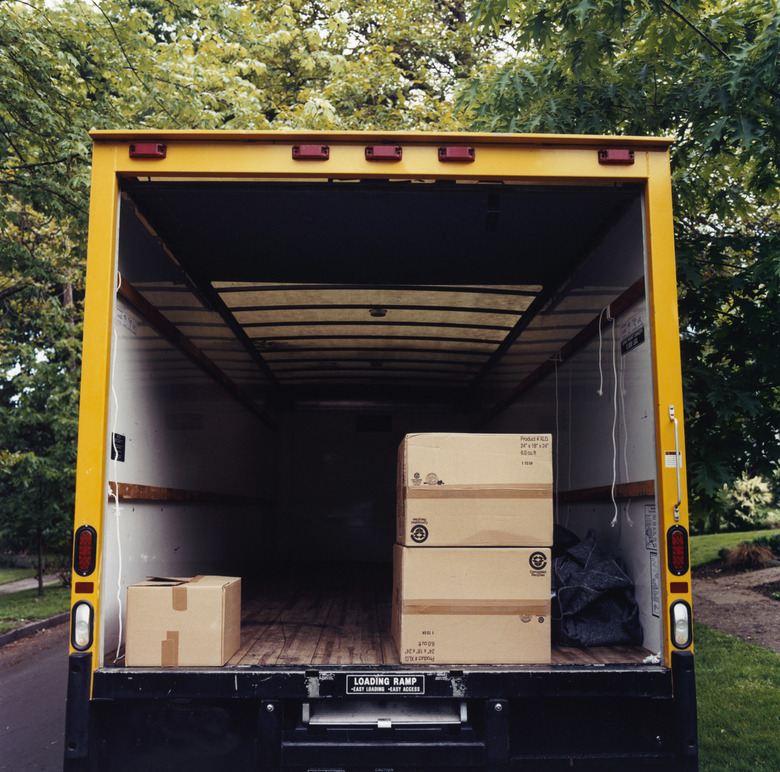15 Genius Ways To Save Money On Moving Costs
We may receive a commission on purchases made from links.
If you're sticking to a budget, then researching how to save on moving costs is key. Moving is surprisingly expensive, and there are usually more things to take into consideration than you think. If you don't plan ahead, you'll have to pay premiums on packing supplies, movers (if you hire professional help), junk removal, and more. There are, however, several creative ways you can save money on your move while still outsourcing some of the heavy lifting.
1. Look for Free Moving Boxes
1. Look for Free Moving Boxes
While you definitely don't want to sacrifice sturdiness and end up with flimsy cardboard boxes that will break on you, there are ways to score high-quality, free boxes. Ask friends and neighbors or check out your local grocery and liquor stores when looking for strong boxes. They may have some high-quality boxes that they no longer need. You may even be able to find some on free sites, like Craigslist.
Use your best judgment when filling used boxes, keeping in mind that they could be flimsier than brand-new ones. Fill used boxes with relatively light and nonbreakable items, like towels and kitchen tools. To avoid any devastating accidents, purchase a few new, strong moving boxes to hold your breakables and valuable items.
2. Consider the Timing
2. Consider the Timing
Believe it or not, there are specific times (seasons, months, days of the week) during which it's more expensive to move than other times. Summer tends to be the busiest time of the year for movers, which means moving expenses are high. With clear weather and vacation days aplenty, it's easy to see why most homeowners choose to move during the summer months. But it's better for your wallet to plan your move sometime between the end of September and the end of April, avoiding the May to September time period at all costs. Professional movers will be less expensive during the off season and so will truck and moving supply rentals.
Movers also tend to be busier (and pricier) on the weekends, which makes sense as most people won't have to take off work to spend those days moving. So, to cut costs, try to plan your move for a weekday. But keep in mind that if you have to take the day off work to move in the middle of the week, you could lose money depending on your employer's leave policy, meaning this wouldn't be the most cost-effective decision.
3. Declutter Before Moving Day
3. Declutter Before Moving Day
If you're hiring movers or renting a moving truck to move your belongings, the more boxes there are or the more time it takes to move them, the more you'll pay. Cut costs by decluttering your whole house well before your moving date arrives. Go through each space and throw away trash, donate used items, and host a garage sale to sell things you no longer need. Decluttering will save you money on moving costs and make the entire moving process easier because you won't have to lug unnecessary stuff from point A to point B.
4. Save Donation Receipts
4. Save Donation Receipts
While you're decluttering, set aside items to donate to nonprofit organizations that could use them. Many organizations accept (and welcome) gently used clothing and household items, which should make dropping off a donation simple. Organizations will typically give you a receipt when you drop off a donation so you can claim and deduct it on your tax return. After dropping off a donation, always ask for a receipt showing the date and value of your goods. Put it somewhere safe so you can save money next tax season.
Some nationwide charities to which you can donate your home goods include:
- Goodwill
- Habitat for Humanity
- Salvation Army
5. Pack Your Belongings Yourself
5. Pack Your Belongings Yourself
Most professional moving services have a DIY packing option that allows you to do the packing yourself. The movers will move the boxes (and furniture and other bulky items) from your old place to your new home. DIY packing comes with a discount, so opting to pack things yourself will save you money on your move. Packing your stuff yourself is one of the most effective ways to save money on moving costs without sacrificing a huge chunk of your time. If you start packing a few weeks before your move, the process should be relatively stress-free.
Moving companies usually sell packing supplies if you opt to pack yourself, but they are generally more expensive than ones you can find yourself. It's almost always more cost-effective to purchase your own packing materials, like packing tape and bubble wrap, instead of buying them through the company.
6. Get Multiple Quotes From Movers
6. Get Multiple Quotes From Movers
For the extremely budget-conscious homeowner, hiring professional movers is usually off the table. Movers are an added cost, but depending on the scope of your move (and whether or not it's long distance), it may be worth it. Before you hire movers, do your research. Don't simply hire the company with the lowest prices; compare the pros and cons of a few different companies and get quotes from at least three of them to compare prices. Although one company's upfront prices may be lower than others, it may not offer the same services, meaning you'll have to pay extra if you need to move furniture up stairs, for example.
7. Start Planning Early
7. Start Planning Early
The sooner you start planning for your move, the more money you can save. Booking your movers early — about a few months out — will lock in prices, and some companies even offer early bird discounts for early bookings. Equipment and truck rental prices will be lower if you rent in advance instead of waiting until the last minute, and the same goes for packing supply prices. Start thinking about what you need to do for your move a few months in advance so that you have time to take advantage of discounts. Planning every detail of your big move will also prevent you from having to make last-minute purchases of things like extra packing supplies out of desperation.
8. Don’t Waste Food
8. Don't Waste Food
If you're looking for an easy way to save on moving costs, this is your best bet. It comes with planning your move early. Hold off on big grocery trips during the final weeks before you move into your new home so that you can eat what you already have stockpiled in your pantry, fridge, and freezer. Try to plan meals around the food you already have. That way, you won't have to move as much stuff to your new house when the big day arrives.
9. Prepare for the Movers
9. Prepare for the Movers
Hiring movers is already an added moving cost, so why not make it as cheap as possible? Many professional movers charge per hour, which means you can save a good chunk of change by making the job as quick and easy for them as possible. If you're doing your own packing, pack everything neatly (with accurate labels) and stage them in the garage or near the front of your house so they can easily access them. Have a plan of action in order so you can tell them what needs to be moved — like if you have a few large pieces of furniture upstairs — to minimize confusion. Make sure that they have space to park their truck and have an easy and safe way to get in and out of your home.
10. Consider a DIY Move
10. Consider a DIY Move
If you have plenty of energy and elbow grease to spare, consider tackling the entire move yourself, as in not hiring professional movers at all. Because you won't have to pay for movers, this is a surefire way to save money on moving costs. But depending on the size of your move, it may not be practical. While a DIY move is definitely something to consider, you should also be aware of your abilities and personal comfort level. Saving a few hundred bucks isn't worth risking your health. If you can't swing a DIY move, you can cut costs in other areas.
11. Pack a “First Night Box”
11. Pack a "First Night Box"
Before you pack all of your belongings ahead of your move, pack a "first night box" full of essentials that you'll need on your first night in your new home. Include things like toiletries, snacks, and a change of clothes (plus anything else you think you might need). This will prevent you from buying duplicates of things you already have out of desperation on that first night after an inevitably hectic moving day.
12. Look Into Moving Insurance
12. Look Into Moving Insurance
If you're tackling the move yourself or if the moving company you hire does not offer insurance, look into moving insurance to protect your belongings. Regardless of how you move your things, moving always comes with the risk of damage to or loss of your belongings. Moving insurance will protect you against such damages. If you're moving any valuable goods, moving insurance will save you money in the long run in case something happens to them in transit.
13. Take Photos of Your Belongings
13. Take Photos of Your Belongings
Another way to protect your belongings is to take photos of them. Before you tape up a box, snap a photo with your phone to keep a record of the things you've moved. If you're moving any valuables, like antique furniture, artwork, or electronics, make sure to take a picture of them to document their condition before the move. Most professional movers have some kind of insurance or a clause in their contract that holds them responsible for loss or damages in transit, so having accurate pictures of your belongings before the move gives you proof and will increase your chances of getting reimbursed for the loss or damage.
14. Ask Friends and Family for Help
14. Ask Friends and Family for Help
Your friends or family members may be willing to help you pack and transport your things to your new house for a lot less money than professional movers. If you're opting to pack or complete the entire move on your own, this is a great option to split up the workload while saving money. Offer to buy them dinner or help them with one of their chores to return the favor.
15. Cancel Utilities on Time
15. Cancel Utilities on Time
Moving is a stressful process, so it's easy to forget seemingly unimportant things, like utilities and other service providers. But if you don't cancel them on time or transfer them to your new property, you could end up overpaying for the month. A few weeks before your move, make a point to contact your utility companies to transfer your service. This simple task shouldn't take more than an hour or two, but it could save you hundreds of dollars during your move. Just make sure you don't shut off your power too soon — packing boxes in the dark doesn't sound very fun.



